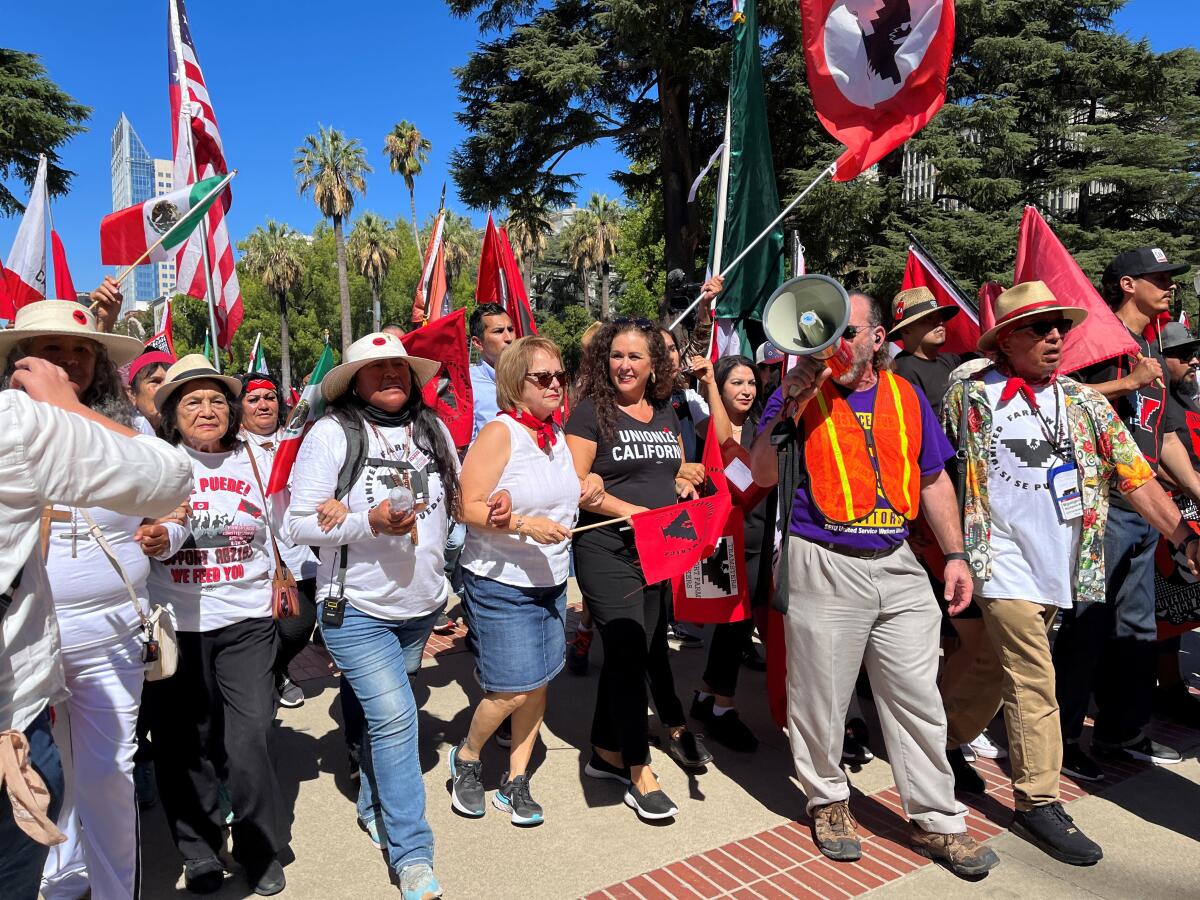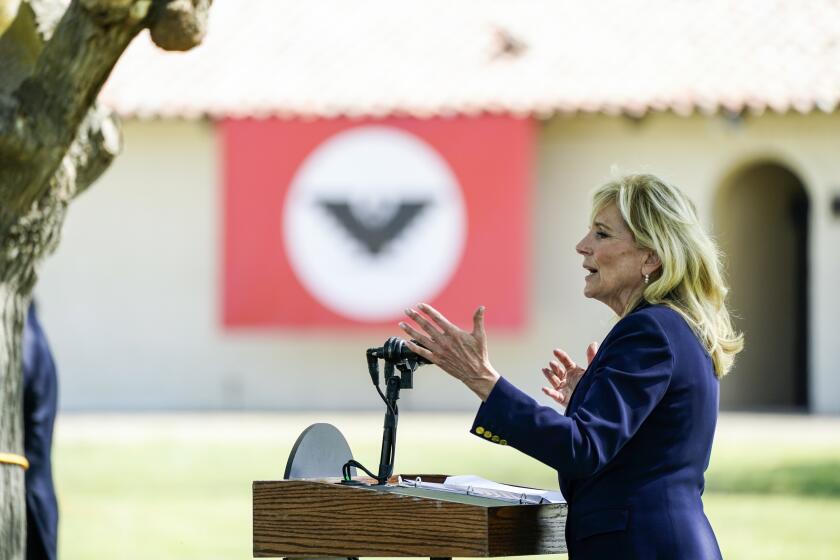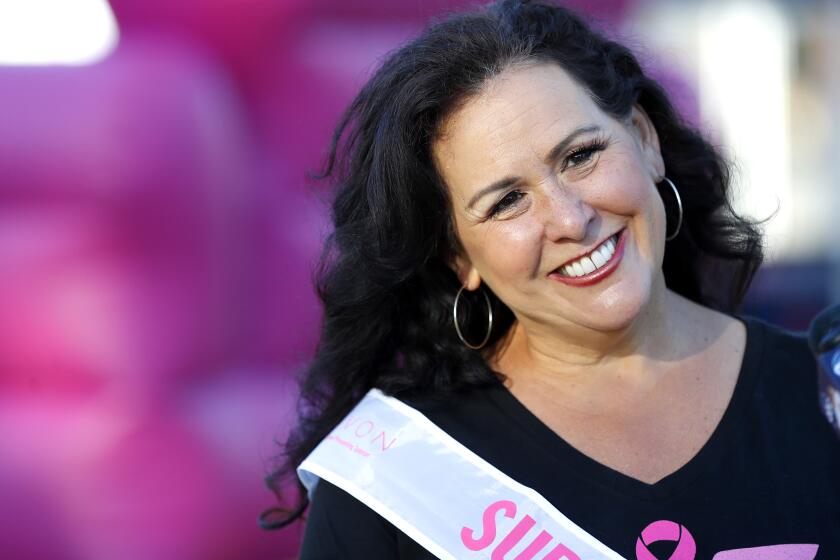Column: Farmworkers just rolled Newsom. What does it say about the Latino vote?

- Share via
SACRAMENTO — Turns out “Sí, se puede” isn’t just a rallying cry. It’s a threat.
Gov. Gavin Newsom just learned that the hard way.
On Wednesday afternoon, after a morning of glory in which Newsom signed a number of important laws to break the logjam on affordable housing in California, word started leaking out that he would also put pen to paper on Assembly Bill 2183, a measure by the United Farm Workers meant to make it easier for those who labor in our fields to form a union.
It’s a bill Newsom has fought against vehemently for months and promised to veto if it reached his desk. But for weeks since it actually landed in his lap, it has mushroomed into a political nightmare.
The Capitol stairs have become home to dozens of farmworkers holding a vigil to demand his signature. President Biden and Vice President Kamala Harris put out public statements in support of it, as did House Speaker Nancy Pelosi (D-San Francisco), Newsom’s political mentor. Rage Against the Machine’s Tom Morello traveled to Sacramento to sing “This Land Is Your Land” with union members.
The farmworkers have danced, marched, dined and interviewed ceaselessly — backed by big names and big love for a profession that is honored as much as it is abused in this state.
The president on Sunday schooled Newsom on Labor Day politics by endorsing United Farm Workers legislation that could help the UFW organize.
At the same time, Newsom helped dig his own hole by going after Florida Gov. Ron DeSantis for his despicable stunt of flying migrants to Martha’s Vineyard. Newsom rightly spoke out against using vulnerable humans for political points — only to find himself knocked around for failing to stand up for the vulnerable migrants in his own state.
That one was the nail in the coffin for his opposition to the farmworker legislation. Though he is most certainly not running for president, vetoing this bill would have been both a talking point and a real problem within the labor movement if he was to make such a run.
Why Newsom has been so adamantly against the legislation has always been a bit murky. Officially, the argument was that he was concerned that the proposal could have given UFW too much time and leeway when it came to organizing — months and months to gather signatures from workers who may have moved on to other employers by then.
The last-minute deal to sign the bill includes changes that will have to be made via superseding legislation next term, including fixes that give the Agricultural Labor Relations Board more power over the new system, and capping the number of union drives that can happen over the five-year life of the bill before its provisions come up for renewal.
Unofficially, some griped that as a winery owner, Newsom was too close to growers and their interests. They pointed out that his PlumpJack brand, which is being managed in a blind trust while Newsom is in office, expanded to buy another winery even as farmworkers marched 335 miles to the Capitol to fight his promised veto.
Against that backdrop was the contention from some — fair to a point — that UFW was a weak union that hadn’t organized so much as a dinner dance in years.
It was likely that perception, that UFW was small and decrepit, that led Newsom to think a veto of the bill was possible.
Back when this fight started, it may have been a reasonable political calculation that the union made famous by Dolores Huerta and Cesar Chavez decades ago was a relic — venerated but irrelevant. Its membership had fallen to a few thousand, its organizing record is slim, and the agriculture industry had changed to rely more and more on undocumented workers who are migratory and often too vulnerable to risk angering an employer by signing a union card. The threat of deportation for those who battle their farm bosses is real and pervasive.
But that was a huge misread of who and what the farmworkers are in California. I’m not saying that with the 20/20 of hindsight, now that Newsom has been backed into a political corner and the ink is drying. The warning signs were large and flashing.
In July, after 16 years of being on their own, UFW rejoined the umbrella of labor unions known as the California Labor Federation. UFW leaders were onstage with Lorena Gonzalez, the daughter of a farmworker and a former legislator, when she took over as leader of that organization and vowed that every union would fight with them.
Former Assemblywoman Lorena Gonzalez takes over Wednesday as head of the California Labor Federation. The United Farm Workers will join the umbrella organization under her leadership.
Just days ago, a who’s who of Latino activists and legislators wrote a letter to Newsom urging his signature.
“For a generation of Latino leaders, there is no struggle more personal, more inspiring, or more urgent than that of the farmworkers,” the letter from more than two dozen prominent Latinos read. “Most of us are here because our parents or grandparents came to this country to work in the fields.”
How many in California can relate to that, even if their parents worked in factories or restaurants instead of fields? My own father is a South Asian immigrant, different continent, different struggles. But I feel that deep, personal and urgent call to help others who come here, willing to work and fight for something better.
The fact that our governor didn’t see the power of that pull for so many Californians is a mind-boggling lapse in awareness. The Democratic Party and Newsom have long been criticized for taking the Latino vote for granted. The handling of this bill shows a lack of understanding that the politics of all immigrants, beyond party or even religion, are the politics of hope — that the children of immigrants won’t work in fields, and that their children will be the ones signing bills.
Failing for immigrants has always meant more than a personal loss. It’s a generational loss that people who have risked everything to be here aren’t willing to endure.
That’s why “Sí, se puede” has never had the luxury of being about wishes and desires.
It’s always been a promise. And a warning.
More to Read
Sign up for Essential California
The most important California stories and recommendations in your inbox every morning.
You may occasionally receive promotional content from the Los Angeles Times.













